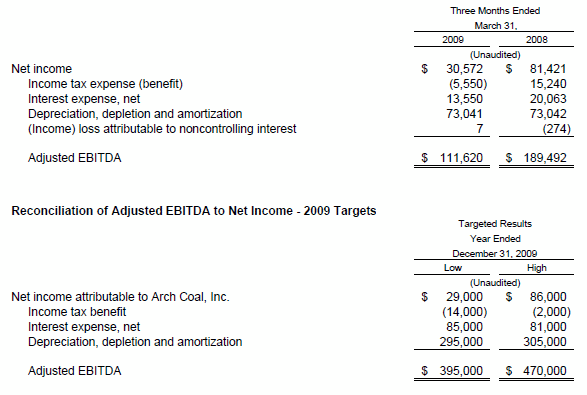Arch Coal, Inc. Reports First Quarter 2009 Results
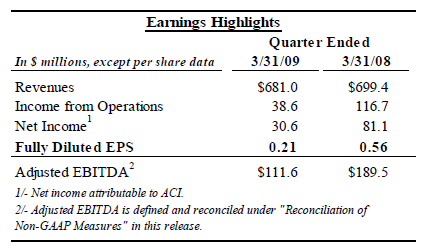
ST. LOUIS (April 24, 2009) - Arch Coal, Inc. (NYSE: ACI) today reported first quarter 2009 net income of $30.6 million, or $0.21 per fully diluted share, compared with $81.1 million, or $0.56 per fully diluted share, in the prior-year period. The company earned adjusted earnings before interest, taxes, depreciation, depletion and amortization ("EBITDA") of $111.6 million in the quarter just ended compared with $189.5 million of adjusted EBITDA earned in the first quarter of 2008 when market conditions were considerably stronger. Sales volumes declined 10.8 percent and revenues declined 2.6 percent versus a year ago, in line with previously announced reduced volume expectations.
"Arch continues to manage its business effectively and profitably in a severe U.S. economic recession and depressed coal markets," said Steven F. Leer, Arch's chairman and chief executive officer. "Our operations achieved strong safety and environmental performances while turning in solid financial results for the first quarter, underscoring the company's commitment to our three key pillars of performance."
During the first quarter of 2009, income from operations and adjusted EBITDA were impacted by $3.4 million of expenses associated with the company's pending acquisition of the Jacobs Ranch mine. Arch also recorded a $6.9 million excise tax refund in the quarter just ended, nearly all of which was reported as interest income.
"Looking ahead, given current weak electric generation and coal demand trends, we have elected to further reduce volume and capital spending levels in 2009," said Leer. "In the near term, we remain acutely focused on controlling costs, eliminating discretionary capital programs across the organization, preserving liquidity and maintaining a strong balance sheet."
"While recognizing the recessionary environment of 2009, we are also positioning ourselves for an inevitable market rebound," continued Leer. "We are executing on our long-term growth strategy, as evidenced by the recently announced Jacobs Ranch transaction. With our low-cost assets and reserves in place, we are poised to capitalize when global energy markets strengthen in the future. Our goal is to profitably manage through the downturn while never losing sight of running the company for the long term."
Arch Enhances Long-Term Growth Prospects
On March 9, 2009, Arch announced its intent to purchase Rio Tinto's Jacobs Ranch mine in the Powder River Basin of Wyoming for $761 million. The transaction includes 381 million tons of low-cost coal reserves (at Dec. 31, 2008, as reported by Rio Tinto) that are contiguous to Arch's Black Thunder mine, as well as a high-speed rail loadout; a recently added overland conveyor and near-pit crushing system; strong customer commitments; an expansive fleet of highly efficient mining equipment; and a highly skilled workforce. In 2008, Jacobs Ranch produced 42.1 million tons of high-quality sub-bituminous coal for sale to power generators located throughout the United States.
"Once completed, we believe this transaction will create significant value for Arch, its customers and its shareholders," said Leer. "Jacobs Ranch represents an excellent strategic fit with Arch's existing assets in the Powder River Basin. The integration of Jacobs Ranch into the Black Thunder mine will create one of the world's largest and most efficient mining complexes. The transaction also will enable Arch to provide more efficient and flexible service to its customers in the power generation industry."
Arch currently anticipates financing this transaction with a combination of internally generated cash flow from operations, borrowings under the company's $800 million revolving credit facility and other debt instruments. Consummation of the transaction is subject to certain governmental and regulatory conditions and approvals and other customary conditions.
Arch Operations Achieve Solid Results
"Our operations performed as expected in the first quarter of 2009," said John W. Eaves, Arch's president and chief operating officer. "Our Central Appalachian operations ran well, although price realizations declined due to lower metallurgical coal sales. Our western operations achieved higher price realizations, but lower volume levels and higher hedged diesel prices impacted unit costs. As predicted, our Western Bituminous region was adversely affected by difficult geologic conditions encountered during West Elk's transition to the E-seam."
"As we progress through 2009, we anticipate our cost structure will continue to be impacted by lower volume levels at our operations driven by reduced coal demand as well as higher hedged diesel costs," said Eaves. "However, we do expect to offset some cost pressures with cost control and mitigation efforts implemented at our mines."
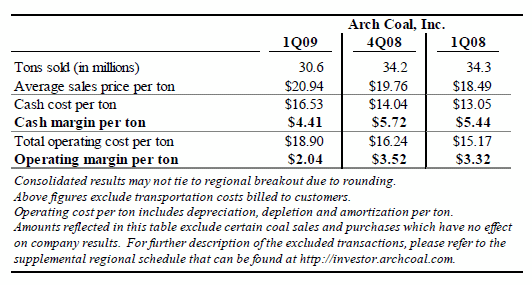
Consolidated average sales price increased $1.18 per ton in the first quarter of 2009 compared with the fourth quarter of 2008, due to higher price realizations in Arch's western operations. First quarter 2009 volumes declined 3.6 million tons from the prior-quarter period. Consolidated per-ton operating costs increased $2.66 over the same time period, reflecting higher operating costs in each of the company's segments. Arch earned $2.04 per ton in consolidated operating margin during the first quarter of 2009 compared with $3.52 per ton in the prior-quarter period.
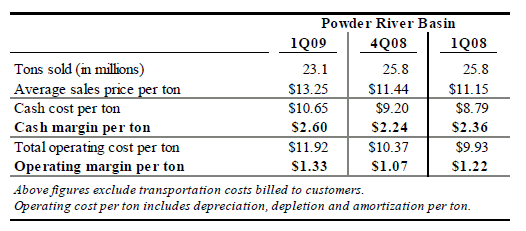
In the Powder River Basin, first quarter 2009 volumes declined 2.7 million tons from the prior-quarter period, reflecting planned reduced volume levels as well as the effect of weather-related events that reduced shipments late in the quarter. Average sales price rose by $1.81 per ton in the first quarter of 2009 compared with the fourth quarter of 2008, benefiting from stronger contract pricing offset to some degree by lower pricing on market-indexed tons and a larger percentage of lower-priced Coal Creek tons. Operating costs increased $1.55 per ton over the same time period, driven by the impact of lower volume levels, higher sales-sensitive costs, increased repair and maintenance expense and higher hedged diesel costs. The region's operating margin expanded by $0.26 per ton in the first quarter of 2009 compared with the prior-quarter period.
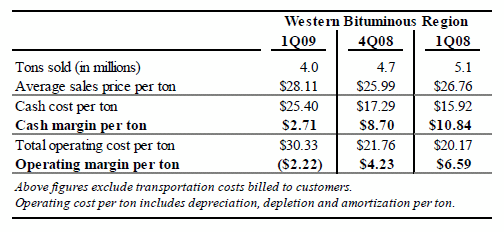
In the Western Bituminous Region, first quarter 2009 volumes declined 0.7 million tons from the prior-quarter period, reflecting the impact of operational challenges at West Elk and reduced volume levels. Average sales price increased $2.12 per ton in the first quarter of 2009 compared with the fourth quarter of 2008, benefiting from stronger contract pricing offset by a reduction in the coal quality shipped from West Elk. Operating costs rose by $8.57 per ton over the same time period, driven by the expected difficult geologic conditions in the first panel of the new coal seam at West Elk as well as the impact of reduced volume levels. As a result, the Western Bituminous Region incurred an operating loss of $2.22 per ton in the first quarter of 2009 compared with an operating profit of $4.23 per ton in the prior-quarter period.
"West Elk has absorbed its start-up issues and is managing the situation increasingly well," said Eaves. "Going forward, we are continuing efforts to improve coal quality through better segregation procedures and blending efforts. We also expect mining conditions and coal quality to improve as the longwall progresses in the current panel."
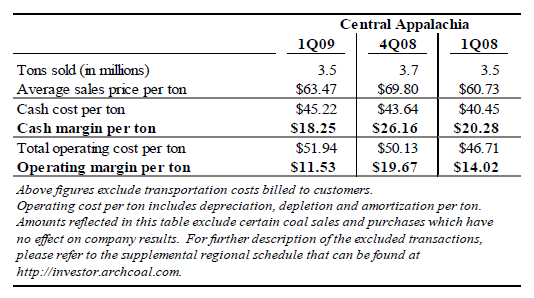
In Central Appalachia, volumes decreased 0.2 million tons and average price realizations declined $6.33 per ton in the first quarter of 2009 compared with the fourth quarter of 2008, reflecting reduced metallurgical coal shipments and lower pricing on metallurgical coal sales. Operating costs per ton rose slightly over the same time period, due to the impact of lower volume levels and an unfavorable comparison with the fourth quarter of 2008, which included an excise tax refund of $9.3 million in the region's results. Arch's Central Appalachian operations contributed $11.53 per ton in operating margin in the first quarter of 2009 versus $19.67 per ton in the prior-quarter period.
Arch Remains Focused on Core Values
In the first quarter of 2009, Arch's lost-time safety incident rate declined to 0.34 incidents per 200,000 hours worked - representing a 72-percent improvement from the year-ago quarter. Two-thirds of Arch's individual mines, preparation plants and terminals completed the first three months of the year without a lost-time incident. Also during the quarter, Arch's Coal-Mac subsidiary earned West Virginia's top honor for best safety performance among the state's surface coal mines in 2008. Additionally, both Coal-Mac and Mountain Laurel were awarded West Virginia's Mountaineer Guardian Awards for achievements in employee safety.
Arch also received several awards to date in 2009 for ongoing environmental stewardship efforts. Arch subsidiaries earned three top state honors in West Virginia for wildlife preservation and environmental excellence in the past year. The West Elk mine in Colorado received two state awards in the first quarter of 2009 for its proactive reconstruction of Monument Dam and for conservation and recycling measures. Lastly, all three mines in Utah - Sufco, Dugout Canyon and Skyline - recently earned state Earth Day Awards for outstanding stewardship practices, particularly in the areas of wildlife habitat enhancement and land restoration.
"We are off to a great start in 2009 in terms of safety and environmental performance," said Eaves. "We are proud of these awards, and of our ability to continuously build upon our industry-leading safety and environmental records."
Arch Further Reduces Capital Spending Levels in 2009
Arch traditionally invests a high percentage of its total capital budget in the first quarter, and that was again the case in 2009. During the first quarter, Arch recorded spending on land, equipment and infrastructure of approximately $192 million - $128 million of which related to investment in reserve additions, including the final payment on the Little Thunder lease in the Powder River Basin. The balance of capital spending in the first quarter is attributable to maintenance programs and completion of the E-seam transition at West Elk.
For full year 2009, Arch has elected to further trim its discretionary capital spending beyond the previously announced reduced levels. The company now expects to spend $195 million to $215 million for capital programs and $140 million to $160 million for land and reserve additions during 2009.
"We are trimming Arch's previously announced capital spending levels by more than $80 million in 2009 in response to current market conditions and to preserve our liquidity," said John T. Drexler, Arch's senior vice president and chief financial officer. "While we have a positive long-term outlook for U.S. coal markets, our projected capital expenditures reflect our reduced planned volume levels and our expectation for soft near-term demand."
Arch Further Reduces Production Levels in 2009
Given the current weakness in the U.S. economy and international and domestic coal markets, Arch has again reduced its production targets for 2009. The company now projects sales volumes from company-controlled operations of 116 million to 120 million tons for the full year. Volumes are being reduced generally on a pro-rata basis by region. In particular, the company has elected to idle another dragline and a shovel at the Black Thunder mine.
"This further reduction in volume is predicated upon the weak demand trends and high generator stockpiles that we're seeing in the marketplace, and eliminates virtually all of the company's unsold tonnage for 2009," said Leer. "We believe our efforts to reduce volumes will preserve our low-cost reserve base for the future, when market conditions are expected to substantially improve."
As a result of lower metallurgical coal shipments in the first quarter, the company's planned reduced volume levels and the flexibility to profitably shift some low-cost tons into steam coal markets, Arch now expects to sell between 1.5 million and 2.0 million tons of coal into international and domestic metallurgical markets in 2009 versus 4.4 million tons in 2008.
Given Arch's revised volume levels and the signing of a few, small, 12-to-24 month contracts during the first quarter of 2009, the company now has unpriced coal volumes of 5 million to 6 million tons in 2009, nearly all of which is committed. Based on 2009 forecasted production levels, Arch has uncommitted volumes of 25 million to 35 million tons in 2010, with an additional 10 million tons committed but not yet priced. In 2011, the company has uncommitted volumes of 75 million to 85 million tons, with an additional 10 million tons committed but not yet priced.
Coal Markets Remain Depressed; Current Trends Unsustainable Over Long Term
Arch believes current depressed coal market trends are unsustainable over the long term. According to the Edison Electric Institute, overall electric generation has declined 3.4 percent year-to-date through April 18. Arch currently forecasts power generation to decline roughly 4.0 percent this year, which would represent the largest decline in power demand on record.
The company now expects U.S. coal consumption to decline more than 100 million tons in 2009, based on just released data through February as reported by the Energy Information Administration. This expected decline in coal consumption reflects overall weaker power generation trends, stronger nuclear utilization, increased precipitation in hydroelectric power regions, fuel switching to natural gas, weak demand facing industrial customers, reduced need for coking coal from domestic steel producers as well as the impact of lower coal exports.
Given anticipated coal consumption declines and growing generator stockpile levels, Arch believes that coal production and capital spending levels industry-wide are in the process of significant rationalization, setting the stage for the next market upswing when global economies begin to improve.
Year-to-date, coal production has declined 3.8 percent through the third week of April, according to government estimates. Arch believes that the cash costs per ton for more than one-third of current production in Central Appalachia are above forward coal index price levels in the region, and thus anticipates additional supply rationalization if weak pricing levels continue. The company also estimates that announced domestic production cuts exceed 50 million tons to date in 2009, and expects that further production cuts are likely as the year progresses - potentially marking 2009 as the largest U.S. coal supply contraction in history.
Arch's long-term outlook for domestic and global coal markets remains strong. The company estimates that at least 170 gigawatts of new coal-fueled electric generating capacity are currently under construction around the world - with 16 gigawatts under construction in the United States. This domestic coal plant build-out translates into an estimated 55 million tons of incremental annual coal demand to be phased in during the next four years.
Arch's Guidance Reflects Reduced Volume and Capital Spending Levels in 2009
Based on the company's current expectations and existing sales commitments and absent any effect of the pending Jacobs Ranch transaction, Arch forecasts the following:
As previously stated, 2009 sales volume from company-controlled operations in the 116 million to 120 million ton range, excluding purchased coal from third parties.
2009 earnings per fully diluted share in the $0.20 to $0.60 range.
Adjusted EBITDA in the $395 million to $470 million range.
Capital spending in the $195 million to $215 million range, excluding reserve additions.
Depreciation, depletion and amortization expense in the $295 million to $305 million range.
"Arch's guidance range reflects the current challenging conditions in the broader U.S. economy and global energy markets," said Leer. "We are going to operate the company under the assumption that no new coal commitments will be made for 2009 volumes, and our production levels will be matched to existing sales commitments. While significantly reduced production levels will have predictable short-term implications, we firmly believe this strategy will provide long-term benefits for our company and our shareholders."
Arch anticipates that second quarter 2009 will be impacted by reduced sales volume levels across the company's operating platform, some remaining coal quality issues at West Elk and four longwall moves - three in Utah and one in West Virginia - scheduled in the quarter.
"Looking ahead, Arch remains committed to following a market-driven strategy, with a goal of matching our future production levels with our expectation of market demand," continued Leer. "We expect to weather the weak part of the energy market cycle, take advantage of opportunities as they develop and be in a position to excel when markets rebound. Our solid liquidity levels and strong balance sheet will allow the company to capitalize on growth opportunities for the long term."
A conference call regarding Arch Coal's first quarter 2009 financial results will be webcast live today at 11 a.m. E.D.T. The conference call can be accessed via the "investor" section of the Arch Coal Web site (www.archcoal.com http://www.archcoal.com>).
St. Louis-based Arch Coal is one of the largest U.S. coal producers, with revenues of $3.0 billion in 2008. Through its national network of mines, Arch supplies cleaner-burning, low-sulfur coal to fuel roughly 6 percent of the nation's electricity. The company also ships coal to domestic and international steel manufacturers as well as international power producers.
Forward-Looking Statements: This press release contains "forward-looking statements" - that is, statements related to future, not past, events. In this context, forward-looking statements often address our expected future business and financial performance, and often contain words such as "expects," "anticipates," "intends," "plans," "believes," "seeks," or "will." Forward-looking statements by their nature address matters that are, to different degrees, uncertain. For us, particular uncertainties arise from changes in the demand for our coal by the domestic electric generation industry; from legislation and regulations relating to the Clean Air Act and other environmental initiatives; from operational, geological, permit, labor and weather-related factors; from fluctuations in the amount of cash we generate from operations; from future integration of acquired businesses; and from numerous other matters of national, regional and global scale, including those of a political, economic, business, competitive or regulatory nature. These uncertainties may cause our actual future results to be materially different than those expressed in our forward-looking statements. We do not undertake to update our forward-looking statements, whether as a result of new information, future events or otherwise, except as may be required by law. For a description of some of the risks and uncertainties that may affect our future results, you should see the risk factors described from time to time in the reports we file with the Securities and Exchange Commission.
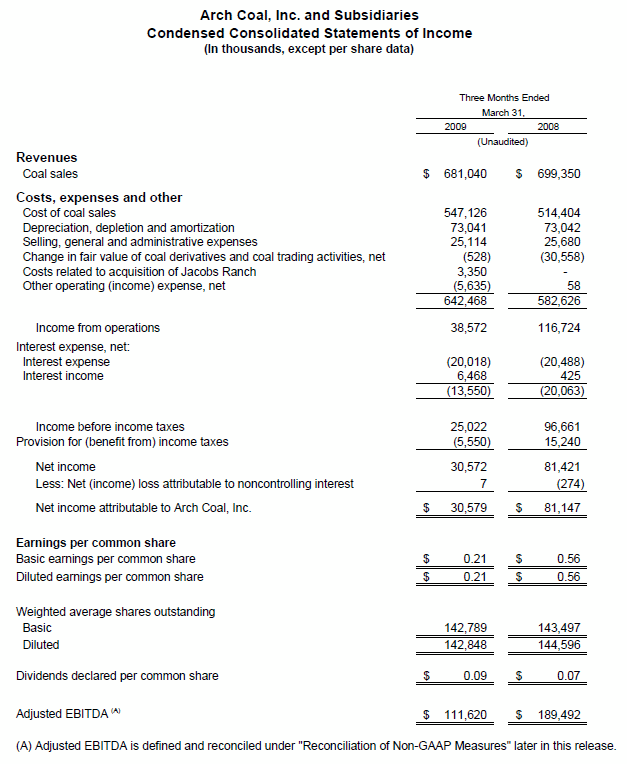
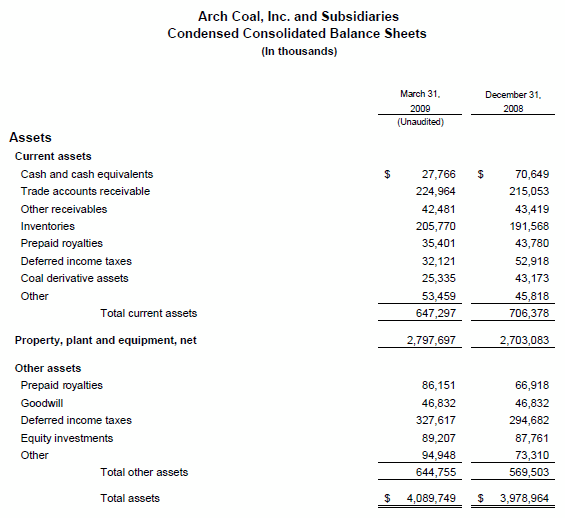
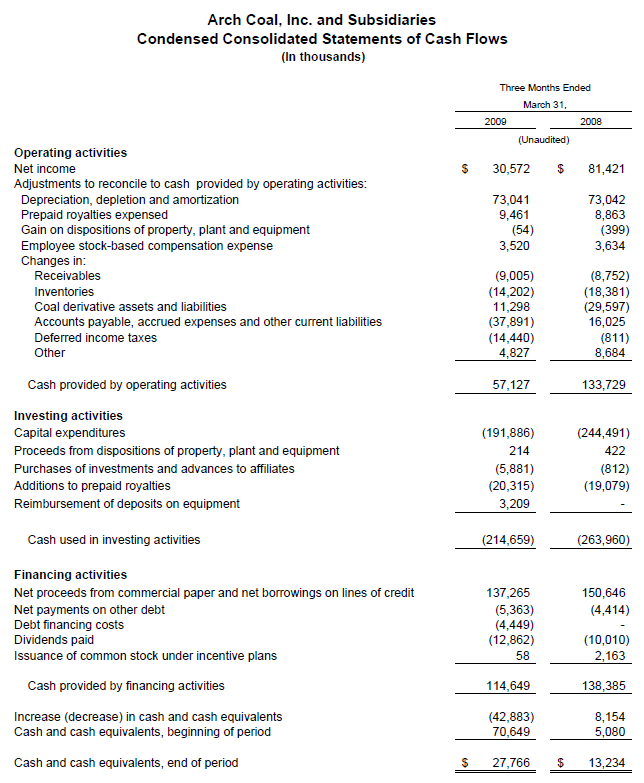
Arch Coal, Inc. and Subsidiaries
Reconciliation of Non-GAAP Measures
(In thousands)
Included in the accompanying release, we have disclosed certain non-GAAP measures as defined by Regulation G. The following reconciles these items to net income as reported under GAAP.
Adjusted EBITDA:
Adjusted EBITDA is defined as net income before the effect of net interest expense, income taxes and our depreciation, depletion and amortization; less the income or loss of subsidiaries attributable to noncontrolling interests. Adjusted EBITDA is not a measure of financial performance in accordance with generally accepted accounting principles, and items excluded to calculate Adjusted EBITDA are significant in understanding and assessing our financial condition. Therefore, Adjusted EBITDA should not be considered in isolation nor as an alternative to net income, income from operations, cash flows from operations or as a measure of our profitability, liquidity or performance under generally accepted accounting principles. We believe that Adjusted EBITDA presents a useful measure of our ability to service and incur debt based on ongoing operations. Furthermore, analogous measures are used by industry analysts to evaluate operating performance. Investors should be aware that our presentation of Adjusted EBITDA may not be comparable to similarly titled measures used by other companies. The table below shows how we calculate Adjusted EBITDA.
